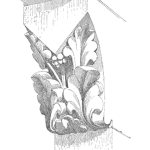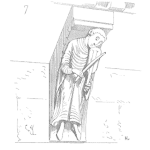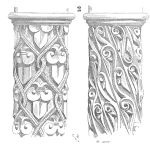
WQW 012: Quality Is Expectation

Your Reliability Engineering Professional Development Site

by Christopher Jackson Leave a Comment

Chris and Fred discuss when you should do this thing called Monte Carlo simulation? … in fact … what is it?
ᐅ Play Episode
by Christopher Jackson 2 Comments

Chris and Fred discuss how we can go about estimating reliability … especially when you don’t have a lot of data, experience or other things that textbooks say you need to have to estimate reliability?
ᐅ Play Episode
by Fred Schenkelberg 3 Comments

I recently received a question about the artwork found at Accendo Reliability. “Why castles?” So, I provided an answer and thought I would share it in this webinar. Also, let’s talk about how and why Accendo Reliability got started and how it’s been doing over the past ten years. [Read more…]
by Mike Konrad Leave a Comment

We are all aware of the damage electrostatic discharge can wreak on components and electronic products. We mitigate ESD damage through various forms of monitoring. We wear wrist and heel straps, stand on ESD-safe flooring, utilize ESD work stations, and more. We even have ESD testing locations that will test a human standing on a specialized testing station. But what happens the moment that person steps off the tester?
My guests today are Dr. Daan Stevenson and Dr. Jonathan Tapson of IONA Tech, a manufacturer of a novel wearable ESD monitoring device that provides constant real time ESD monitoring.
Normally, I don’t talk about specific products on the show. We usually limit our conversations to best practices. This is a little bit of an exception to my normal rule. From time to time, a product is introduced that is so novel, it’s worthy of a conversation. And that’s the case here.
Dr. Daan Stevenson is the Chief Executive Officer of IONA Tech. Daan has a background in mechanical and aerospace engineering. During his doctoral research, he studied the high voltage charging of spacecraft, which are electrical capacitors in the same way that the human body is. While working to design an automated ground station for UAVs, he frequently damaged electrical components from electrostatic shocks. This motivated the creation of IONA Tech, with the goal of advancing technology in ESD mitigation.
My other guest is Dr. Jonathan Tapson, Chief Technology Officer of IONA Tech. Jonathan was Professor of Electrical Engineering at Western Sydney University before moving to Telluride Colorado in 2016. He spent his early career conducting sensor and instrumentation research, with a strong industrial focus. During this time he spun out three companies from his research, all of which are successful today. His specialties include low-noise circuits and systems design, mechatronic design and the integration of machine learning into real-time systems.
Contact Information:
Daan Stevenson
daan@iona.tech
Jonathan Tapson
jon@iona.tech
by Carl S. Carlson Leave a Comment

Carl and Fred discuss a reader question about what is called a “living FMEA.” Is this a good idea? How is it done?
ᐅ Play Episode
by Carl S. Carlson Leave a Comment

Carl and Fred discuss a reader question on FMEAs that involve maintenance. Specifically, can a Design FMEA have causes that are maintenance related?
ᐅ Play Episode
by Michael Pfeifer, Ph.D., P.E. Leave a Comment

by Akshay Athalye Leave a Comment

If you want to get in contact with Chris, you can contact him via Linkedin.
by Greg Hutchins Leave a Comment

Greg is an opportunist. Greg wrote 4 best selling books on ISO 9001 in the 1990’s (John Wiley).
Greg now believes that ISO 42001 will be 10 X bigger than ISO 9001. Find out why? ISO 42001 is the new (FDIS) management system standard. Learn how to reposition your work/career/job for this new opportunity. [Read more…]

In a world where too many problems are described and explained more by opinion and emotion rather than by meaningful data and information, this episode provides a couple of examples of how to leverage managers need for numbers. Also, there are a couple of examples where using the wrong numbers or using numbers wrong is self-defeating.
There is a reference to Paul O’Neill, CEO of Alcoa from 1987 to 1999. The YouTube video where he talks about improving the financial book closing process in 1991 is . The comments specific to the financial book closing happen at 27:38 in the video. I highly recommend watching the entire video. O’Neill is one of the greatest corporate leaders ever.
All episodes are at Way of the Quality Warrior website . There are also downloadable copies of the annotated slide decks of presentations made by Keith Fong in the last couple of years. There is also a contact form if you’d like to get in touch.
by Greg Hutchins Leave a Comment
by Greg Hutchins Leave a Comment
by Christopher Jackson Leave a Comment

Many reliability engineers know what fatigue is (in addition to feeling tired). Fatigue is an example of a ‘failure mechanism.’ A failure mechanism is the physical, chemical or electrical process that results in failure. Fatigue is interesting in that it allows something to fail without it ever being exposed to stresses that are beyond its strength. How does this happen? Fatigue is based on cracks. Cracks magnify stresses at their tips. So cycling stresses can have the effect of incrementally (and sometimes very slowly) increasing the crack length at the tip. Fatigue has caused all manners of failures that have surprised us throughout the history of engineering. But now we have learned so much more about this really fascinating failure mechanism can cause steel, aluminium and other material to fail, even when the stresses they experience are tiny. Want to learn more about fatigue? And how you can help prevent it? Join us for this webinar.

Today we’ll dive deep into the world of conformal coating.
More and more assemblies are being subjected to conformal coating to protect the assembly from harsh environments. What’s leading the drive to conformal coat electronic assemblies? What types of conformal coating options are available? What are the advantages and disadvantages of each type?
For circuit assemblies, the protective embrace of conformal coatings ensures reliability, longevity, and performance. As technologies advance, so does the demand for innovative solutions to safeguard our electronic products.
Whether you’re a seasoned industry professional, a curious tech enthusiast, or just someone who’s new to the world of conformal coatings, this episode is your go-to source for in-depth information on the growing trend of applying conformal coating to circuit assemblies.
So, join us as we peel back the layers, and immerse ourselves in the world of electronics protection, and learn how conformal coatings play a pivotal role in keeping our devices humming, even in the harshest environments.
To better understand conformal coating, I invited Lisa Rizzo to the show. Lisa is Senior Director of Strategy & Emerging Applications at HZO. HZO is a global leader & innovator in protective solutions that, according to them, “keep the world running”.
They provide products to markets including consumer electronics as well as high-reliability markets including automotive, industrial, medical, and IoT to deliver a more resilient, reliable, and durable level of protection. HZO specializes in nanocoating solutions that safeguard electronics, electrical products & critical applications in an ever-changing market.
Lisa Rizzo’s Contact Information:
lrizzo@hzo.com
https://www.hzo.com/